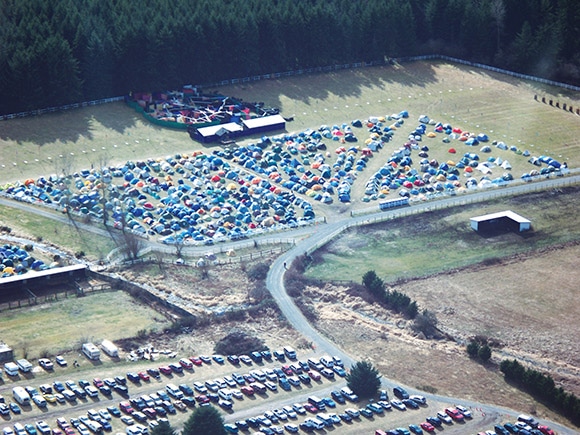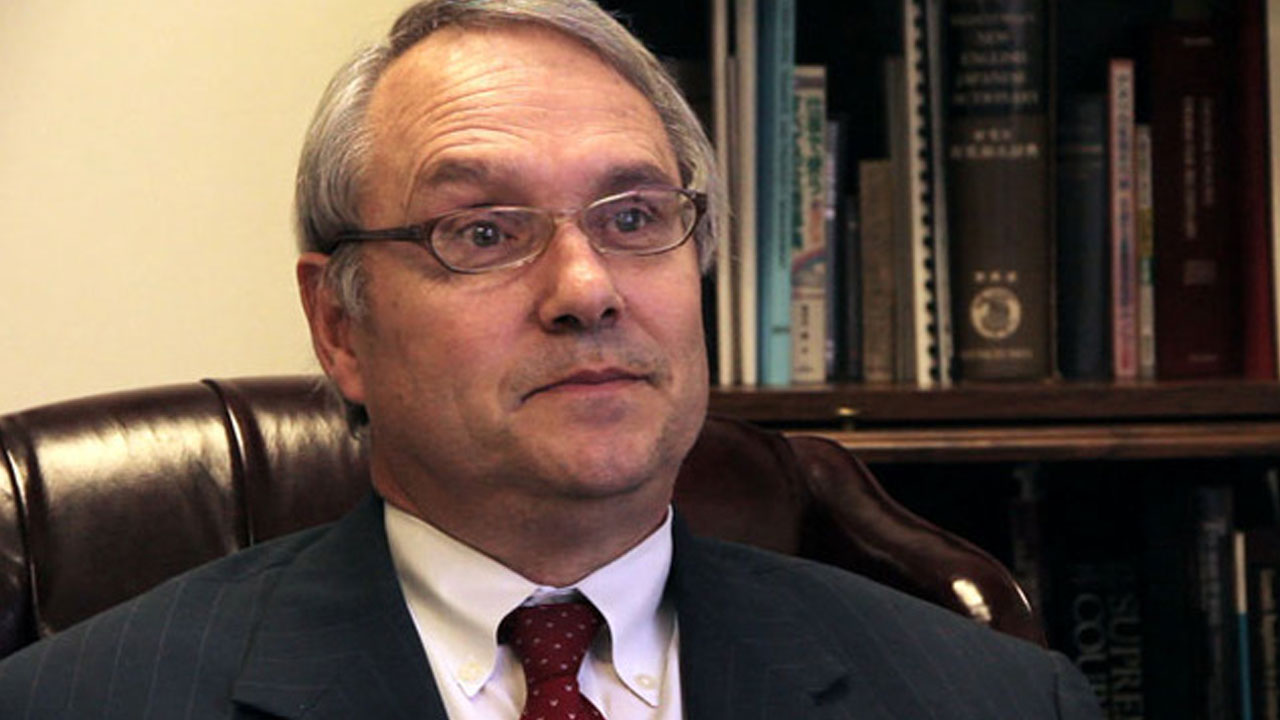Since 1989, a woman who calls herself J.Z. Knight has drawn tens of thousands of followers, including Hollywood celebrities, to her Ramtha School of Enlightenment in Yelm, Wash., where she says she channels a 35,000-year-old “Lemurian warrior.” The New Age cult leader also savages Catholics, Mexicans, Jews and Jehovah.
YELM, Wash. — It’s March 2011 at the Ramtha School of Enlightenment (RSE) in this rapidly growing town just outside of Olympia. Hundreds of truth seekers pack into a converted horse arena to hear a 35,000-year-old Lemurian warrior speak the wisdom of the ages. The crowd is yearning for super-consciousness and enlightenment; what they get is drunken ramblings peppered with curse words. There’s no Kool-Aid served, just red wine, bottles and bottles of it. Wine ceremonies, which have been going on at RSE since 1996, are significant because students believe wine grapes were brought to Earth by extraterrestrials 450,000 years ago.
The blonde on stage is J.Z. (for Judith Zebra) Knight, a 65-year-old former rodeo queen and cable TV saleswoman. The words coming from her mouth aren’t hers, the assembled crowd believes, but rather those of the ethereal being she channels, Ramtha the Enlightened One. Knight goes back and forth between herself and the supposedly channeled Ramtha.
During the 16 or so hours the students spend in a spiritual drinking game (students must drink every time Ramtha/Knight does), Knight will disparage Catholics, gay people, Mexicans, organic farmers, and Jews.
“F— God’s chosen people! I think they have earned enough cash to have paid their way out of the goddamned gas chambers by now,” she says as members of the audience snicker. There are also titters when she declares Mexicans “breed like rabbits” and are “poison,” that all gay men were once Catholic priests, and that organic farmers have questionable hygiene.
These are not the kind of cosmic revelations that have drawn students to Knight for 38 years. For the most part, RSE students are thoughtful and well-educated, not apt to embrace a bigoted guru. For decades, the message had been more about finding the god within than disparaging minorities, and the blend of science and New Age Gnosticism made J.Z. Knight millions well before the drunken homophobic, anti-Catholic, anti-Semitic racist rants began to make their way into her preachings.
What happened at RSE would have stayed at RSE had it not been for the Internet. In 2012, livestreamed videos of Ramtha’s hate speech were posted to the Web, first by ex-students Virginia Coverdale and David McCarthy, then by a libertarian-leaning think tank called the Freedom Foundation that is based in Olympia. The excerpts from that wine ceremony left Thurston County residents shocked and wondering if there was a more sinister side to their kooky neighborhood cult.
Was there a hate group lurking in “The Pride of the Prairie,” as Yelm calls itself? Knight blamed Coverdale, who had slept with Knight’s boyfriend, as a spurned lover, and the libertarian-leaning think tank, the Freedom Foundation, as politically motivated.
But the scandal caused by the videos embarrassed Democratic candidates who had taken a total of $70,000 in campaign donations from Knight. “I am appalled by Ms. Knight’s outrageous anti-Mexican, anti-Catholic raging,” said Thurston County (Wash.) Commissioner Sandra Romero. “These vile, racist, and divisive comments against responsible and caring people have no place in Thurston County, or anywhere else.” Romero ended up giving Knight’s donation to nonprofits benefitting Latinos.
Through it all, Knight has ignored requests for a retraction and maintained that the videos were maliciously edited and taken out of context.
Melissa and Steve Genson, farmers and restaurateurs who also operate an online newspaper, were equally outraged, and Melissa, a CPA and fraud investigator by training, began an intense investigation into activities at RSE. “JZ Knight shrieks abuse and ridicule at her followers, and hate speech against Catholics, Jews, gays, and others — all welcomed with audience cheers,” Melissa wrote in one of a series of critical articles on RSE for the South Thurston Journal.
Raising Ramtha
J.Z. Knight was born Judith Darlene Hampton in 1946 in Roswell, N.M., one of eight children in a family of migrant farm workers. In her autobiography, 1987’s A State of Mind: My Story, she says a Yaqui Indian woman told her mother that baby Judith would one day see what no one else could. In 1977, that prediction came true, as Knight tells it. She and her first husband heard about “Pyramid Power” — the belief that pyramids modeled on those in Egypt could sharpen razor blades and preserve food through mummification — and spent a rather manic weekend constructing paper pyramids and placing various objects (cheese, dog food) inside.
“My kitchen was looking more like a wholesale warehouse than a kitchen, but it was worth it,” Knight wrote. “We retired at three a.m., exhausted.”
The following day, Knight jokingly grabbed one of the paper pyramids, placed it on her head, and Ramtha, a seven-foot-tall apparition of golden glitter clad in a purple robe, appeared in her kitchen. “I am Ramtha the Enlightened One. I have come to help you over the ditch,” she says he told her, and shortly thereafter Knight was in business.
She began channeling Ramtha in public in 1979, presenting his wisdom nationally and internationally through workshops and retreats called “Ramtha Dialogues.” Early students included Shirley MacLaine (who broke off contact with Knight 30 years ago, a spokesman for the actress and author said), and, RSE officials say, actors Richard Chamberlain and Mike Farrell. Actress Salma Hayek and former “Dynasty” star Linda Evans are current students, they add.
That same year, she purchased an 80-acre ranch in Yelm, where she would breed Arabian horses for a time, build herself a 12,800-square-foot chateau, subsequently sell the horses, remodel the 15,000-square-foot horse arena, and open what would become RSE in 1989.
The location has significance that goes beyond cheap land. The region, according to RSE, was actually part of ancient Lemuria during Ramtha’s lifetime, before he migrated to Atlantis and freed his people from tyranny at the age of 14, then went on to conquer two-thirds of the world at the head of an army of 2.5 million. After being run through with a sword during battle, Ramtha sat on a rock and meditated for seven years, became enlightened, taught his body to vibrate at a high frequency and ascended, like Jesus, RSE’s website explains.
“Since the school was founded in 1989, more than 86,000 people worldwide have attended RSE events including about 7,500 in Washington State,” Knight’s Manhattan Beach, Calif.-based PR firm told the Intelligence Report. About 2,000 students live near Yelm, which has a total population of close to 7,000. The students are drawn in by the four tenets of Ramtha’s philosophy: the statement, ‘You are god’; the mandate to make known the unknown; the concept that consciousness and energy create the nature of reality; the challenge to conquer yourself.
The Nazis Cheer
But Knight also teaches students to be sovereign, to hoard gold and prepare food and supplies to survive for two years after one of the natural disasters that she often predicts will hit the earth. Knight as Ramtha is also quoted on the neo-Nazi Web forum Stormfront, where her writings on the “New World Order” are much appreciated and quoted under headings such as “Jews were responsible for causing WW1 & 2.”
“It took a lot to get this country into the First World War, because no one wanted to get into it. And so the Graymen, owning most of the media … do you know what the media is? I have learned that term!” wrote “Ramtha” in 1999’s Ramtha: The White Book (which also carries an introduction by Knight). “The Graymen own them all; you know, the papers you read, the box you watch, the magazines you thumb through, the radio waves you listen to.”
In 2004, RSE students produced an infomercial for the school disguised as a documentary called “What the Bleep do we Know!?” The film grossed $10 million in the United States but was panned by critics. “New Age hooey disguised as a scientific documentary about quantum physics,” is how Jack Garner of the Rochester [N.Y.] Democrat and Chronicle summed it up.
Appearing in the film is Irishman Míceál Ledwith, a former monsignor in the Catholic Church, adviser to the pope, and president at St. Patrick’s College, Maynooth, an Irish seminary dating back to 1518.
Ledwith resigned abruptly in 1994 after allegations of pedophilia, which were later settled out of court, and was defrocked by the Vatican in 2005.
Ledwith, who is part of Knight’s inner circle and has been a student at RSE since 1989, can be seen in the full-length, 16-hour video of the 2011 wine ceremony, where he takes the stage with Knight about seven hours in, propping himself up on Ramtha’s ornate throne.
“F— Jehovah,” Knight proclaims, speaking in Ramtha’s voice and outing Jesus as a fellow alien who came to this planet to basically teach the same things. From the same stage, Ledwith denounces the biblical God as “fickle, capricious, psychotic, neurotic, and insecure, and we are supposed to believe that he is the creator God.” Knight adds that God is a “psychotic, insecure son of a b—-,” which draws a chuckle from the former priest. Then they dance.
Of Orbs and Soap Bubbles
Promoting Ramtha is serious business. Knight oversees 80 employees. In the past, students have paid $1,000 or more to participate in events where crowds often reached a thousand people or more. The school currently holds about 50 events a year, has published more than 600 books, CDs and videos, and has material translated into 18 languages.
Knight is fiercely protective of her kingdom. When a woman in Berlin, Germany, Judith Ravell, claimed that she was also channeling Ramtha, Knight took her to court and won the copyright to Ramtha’s teachings. Later, after another woman, Whitewind Weaver, who had attended a dozen events at RSE, imparted Ramtha’s teachings in an event of her own, Knight sued her as well, and was awarded $10,000 in 2008.
Currently, Knight is involved in legal action against those who released the hate-filled video clips to the Internet in 2012. The efforts of both Coverdale of Yelm and McCarthy of New Zealand to expose the darker side of the Enlightened One have landed them in a courtroom facing Knight. They are supported by a growing online community of ex-RSE students critical of Knight, who they describe as a dangerous cult leader. Coverdale is appealing a $600,000 judgment against her for releasing the videos, while McCarthy has a court date in May.
“The whole idea of Ramtha seemed absolute nonsense. But the RSE students I met were idealistic, intelligent, well educated and very caring, hardly the sort cult members typify, and besides I could just walk away anytime. I was convinced to just give it a try,” says McCarthy, who left the school in 1995 after seven years.
“Most people who attend the RSE flowery love bomb introductory events will be drawn in by very appealing concepts and promises. The promoters will appear smart, happy and very supportive. Nothing like typical cult behavior and recruitment techniques would be recognizable,” he adds. “The trap is set by J.Z. Knight, and those attending are clueless to the cult persuasion techniques they could fall prey to.”
It’s early March 2014, and about 30 students have come to Yelm for a “Beginner’s Event” at a cost of $450 apiece. They’ve brought sleeping bags and pillows, and are sprawled out on the floor waiting for instruction. It begins, as always, with a blast of upbeat pop music, which means the students are to assemble and dance. The schedule is rigorous, from dawn until well past dusk. Most of them sleep in the arena or camp on the compound. There are live lectures from some of the seven RSE teachers anointed by Knight, video lessons from Knight, and a number of spiritual exercises designed to expand the mind.
The music builds to a crescendo as students sit in the lotus position doing “C&E,” a meditative breathing technique which involves clenching the buttocks and thighs followed by forced breaths that make the arena sound like a pit of snakes all hissing in unison. Some students tremble and shout with ecstasy. After about 15 minutes, they don their rubber boots and rain jackets, collect two different cards with drawings of objects or concepts they covet, and proceed to a two-acre fenced paddock. They pin their cards to various places around the paddock, don their blindfolds, spin around and then attempt to find their own cards using only their minds to guide them.
The previous evening, the small class of initiates was joined by an international crowd of around 400 local students — including many young children — who filled the arena, dancing together with joyful abandon as the music throbbed at what was undoubtedly the most happening night spot in the entire county.
During the five-day retreat they’ll learn about orbs, that cabbages scream when you cut them, that the spirit looks like a soap bubble, and that Ramtha has the ability to conjure up spirits such as “Mothman” (along with photographic proof).
They’ll see photos of grinning “ramsters,” as the townies call them, holding up checks for various amounts from Ramtha-inspired wins in the lottery or at the nearby casino, and be lectured on quantum physics. There’s not a whisper of hate, Ramtha is not in attendance (although staff tell students he is always here), and toasts are made with water glasses.

Satire or Simply Slurs?
To this day, there have been no apologies or retractions of the hate speech that has caused RSE such embarrassment. One is not needed, her defenders insist, pointing out that Knight employs lapsed Catholics, former Jews, a lesbian and a Mexican-born man as part of her inner circle. They say her remarks were taken out of context, invoking the example of satirist Steven Colbert telling his audience that the poor should be euthanized. One RSE teacher, Jaime Leal-Anaya, Mexican by birth, explains that Jesus was also taken out of context in the early days of Christianity, and that people mistook his followers for cannibals when Jesus told them to eat of his body, and drink of his blood.
Knight herself consents to answer questions by telephone on day four of the Beginner’s Event. Although she’s at home in the mansion next door, a recent channeling session in Mexico and the death of a beloved pet have left her bedridden.
Unlike her staff, Knight maintains that the offending videos were heavily edited. “We have a very sophisticated videography streaming department. We know what edited looks like,” she says, claiming she would never go through a “multimillion dollar lawsuit” if there were any truth to the clips. Her litigiousness, she explains, stems from trying to protect her business and company secrets. “We are a revered school around the world, I was part of the president’s re-election committee, we are proactive in education, and this is not who we are.”
Knight dismisses Coverdale as a woman who “couldn’t keep the man she was after for more than three weeks and hated me for it for the rest of her life. I never had a conversation with her. She’s somebody who wants to be famous and is a very jealous and envious, controlling person that thought they could make some money off of me,” she claims. “People who say those things, we are taught by the Ram, are really speaking about themselves, it’s the Jung concept of the shadow.”
Knight vehemently objects to her school being labeled as a cult, which she considers another four-letter word. She says she’s tired after 38 years of channeling Ramtha, and plans to retire from the business side of things and write books.
By all appearances, that doesn’t mean she’s planning to go easy on Coverdale and McCarthy. “Those tapes were illegal from the get-go, and that they were distributed, edited and chopped to make us look like bigots and hateful people when nothing could be further from the truth, nothing!” she charges. “I will not let other people rewrite our history!”
Coverdale, for her part, is not backing down. “Although admittedly, as a rule, the cult does not have as one of its ideologies hating Mexicans or Jewish people or gay people or Catholics, J.Z. Knight herself is proving she does as her [drinking] increases and she is unable to keep up the love act she had going in the ’80s. It is beyond hate speech,” Coverdale says.
“In America, there are many First Amendment rights I agree with, even if I disagree with what is being said. Where I get concerned is when you have a large group of people that believe they are hearing from a powerful enlightened entity, creating an ‘us versus them’ situation.”




